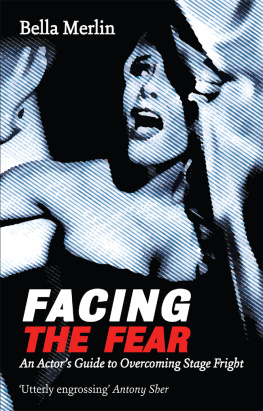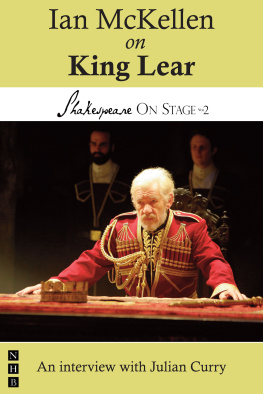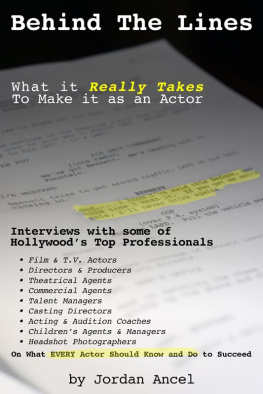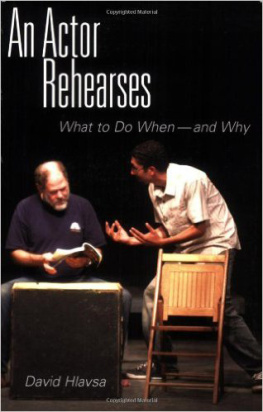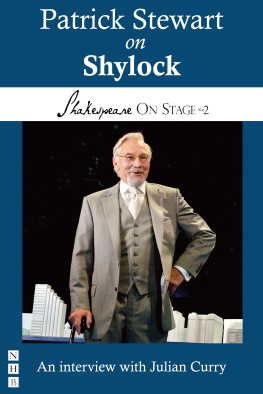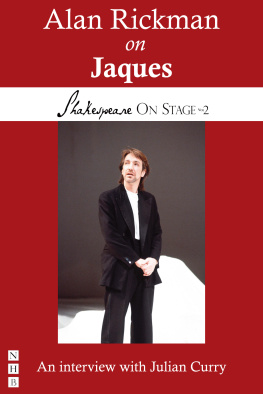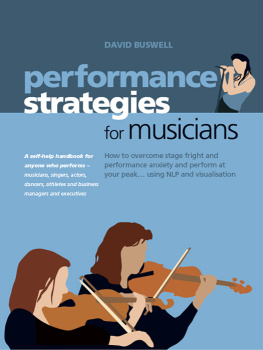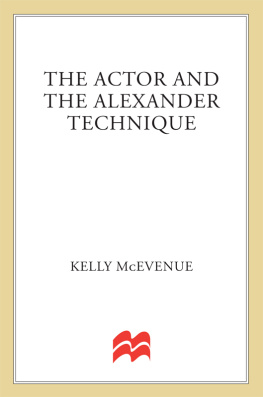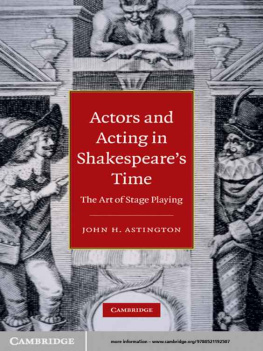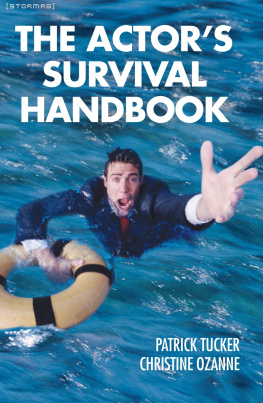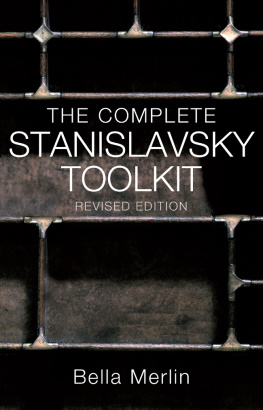FACING
THE FEAR
An Actors Guide to Overcoming Stage Fright
Bella Merlin

NICK HERN BOOKS
London
www.nickhernbooks.co.uk
Contents

The Role of the Fear
The Role of the Audience
The Role of the Brain
The Role of the Actor-Director Relationship
The Role of Our Self as the Actor
Stage fright is always waiting outside the door, waiting to get
you. You either battle or walk away
Laurence Olivier
Lets not battle.
Lets not walk away.
Lets face the fear.
Acknowledgements

This book wouldnt exist without the stories and shared experiences of the actors and directors who have contributed to this journey, either in dialogue with me or through their published accounts. Personal thanks go to Mike Alfreds, Anthony Bianco, John Cariani, Donald Carrier, Winslow Corbett, Ben Diskant, Matthew Dunster, Giles Fagan, Amy Cole-Farrell, Sam Graham, David Hare, Georgia Hatzis, Jeff Horger, Caroline Hunt, Ron Hutchinson, Tanya Moodie, Rufus Norris, Maggie OBrien, Tim Orr, Jonno Roberts, Richard Seer and Jay Whittaker. Their honesty and open-heartedness have been enormously generous. I am ever grateful to Max Stafford-Clark and Tina Packer, for giving me wonderful opportunities to play and teaching me so much. Thanks, too, to voice coach Margaret Jansen. To Adrian Noble, for letting me sit in on three seasons of rehearsals at the Old Globe San Diego and eavesdrop on his wisdom. To Anna Kritikos, for tirelessly transcribing hours of interviews while being an inspirational young actor in her own right. To my agents, Natasha, Jen, Lindsay and Perry, for being ever patient and loyal. To the terrific faculty, staff and students of the Theatre, Film and Digital Production Department at the University of California, Riverside. To Michael Nott, for his perspicacious comments, and to Margaret Nott, for herinvaluable help with the biology. To Dr Dee Silver, for running through the neuroscience with a fine-tooth comb. To the brilliant team at Nick Hern Books (not least Matt Applewhite, Jon Barton and Jodi Gray). And finally to the two people without whom I simply couldnt have written this book. Its rare for any author to have the kind of personal mentorship that I have been privileged to receive from Nick Hern over the last fifteen years. I owe much to his absolute precision, impeccable vision, and wonderful sense of humour. And to Miles Anderson, a great actor, an inspirational director, a devoted reader of chapters (even when they werent in a fit state to be read by anybody), and a patient and nurturing husband. Without him, I really wouldnt be able to face the fear.
Preface

It was the summer of 2011 when I started thinking seriously about writing a book on stage fright. I was with my husband, Miles Anderson, at the Old Globe Theatre in San Diego, California, where he was playing two vast roles in one Shakespeare festival under the direction of Adrian Noble. Knowing that he would only have a few weeks rehearsals for Prospero in The Tempest and Salieri in Amadeus Miles started learning his lines months in advance. A strict schedule of so many lines every day for so many weeks dictated his life. And each day, for hours on end, he would labour over his scripts sitting on the sofa, walking in the woods, staring at the stars muttering and musing and magicking the roles. His hard work certainly paid off that summer to overwhelming critical acclaim, yet still the little demon of performance nerves would wink from the wings on the odd occasion and nibble away at his confidence.
The following year I found myself facing a similar challenge, when I was cast in the Colorado Shakespeare Festival under the direction of Shakespeare guru Tina Packer. Months in advance of the dauntingly short rehearsal period, I began the inevitable line-bashing. I knew that I had to be totally confident from the minute I entered the rehearsal room: there could be no room for self-doubt. And why? Because I was harbouring a dirty secret. Their brave and public admissions of stage fright galvanised my belief that this book Facing the Fear could perhaps be very useful to the acting community at large.
Its hard for anyone who hasnt suffered stage fright to know what its actually like. Its hard for directors to truly understand what actors are going through in rehearsal or performance, unless theyve been actors themselves. Its hard for audience members however versed they might be in theatre to comprehend the inner chaos. Im alone oh, God, how alone I am! bewailed Laurence Olivier, as he waited in the wings to go on as Shylock. Nobody understands this nobody.This book is different, though. Its not about public speaking. Nor is it about performing music. Its about the specific challenges facing actors. The challenges of taking on another character. Of speaking somebody elses words. Of trying to synchronise our own feelings with those of the fictional character. And what do we do if our feelings are completely different from the character such as when were suffering stage fright? How on earth do we reconcile our own nerves with a cool, calm or confident character? Thats an unnerving schizophrenia that maybe only actors can understand.
Its common knowledge that many musicians use beta blockers to reduce the physiological effects of their performance anxiety (indeed, Solovitch talks about it openly) though Ive never heard an actor share this practice. Maybe thats because our art relies on us being absolutely present to our feelings, sensations, and emotions. Acting is all about opening our heart and being emotionally thin-skinned, whereas beta blockers are all about blocking our hearts adrenalin receptors. That said, maybe my actor-friends are taking beta blockers and its just another dirty secret. Who knows? I do know that what we do as actors is complex and subtle, as indeed is stage fright. So while this book offers insights for directors, stage managers, critics, audiences, et al., ultimately its for all fellow actors and companions on the path. How much more could we help each other if we knew what we might be secretly going through?
Introduction

The actors nightmare
Youre standing on the stage in front of a packed auditorium. All eyes are on you. The lights. The darkness. The moment of glory. Then suddenly out of nowhere the dry mouth the sweaty palms the shaking knees and the empty head. Lines well learnt now lost in space. The feeling of falling failing freaking out and fainting. And then you wake up!
Yet for many of us as actors, the nightmare becomes a reality. Stage fright or The Fear, as Antony Sher famously calls it has the power of a monster to drive seasoned professionals and acolyte beginners away from the stage for months, years, and even lifetimes. Laurence Olivier suffered stage fright from his teens to his sixties. Barbra Streisand avoided live performance for twenty-seven years. Marilyn Monroe, Ian Holm, Carly Simon, Kenneth Branagh not to mention the great actor-trainers, Lee Strasberg and Konstantin Stanislavsky the list of sufferers (in varying degrees) goes on and on

